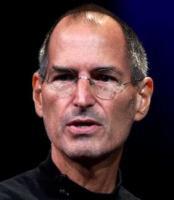
The job of leading an international business organisation like Apple can be as fantastically complex as running a military unit, or a nation. The business environment is constantly changing, new challenges appear when least expected and there are no set criteria for growth. It hardly makes sense for us to assume that a person could be born with all of the skills that might be needed to lead. To cut to the chase - leaders are people who learn from their experiences and hence they are always made.
Case in point is Steve Jobs and the global company that he helped create, Apple. Many of Apples earlier innovations were flops. In 1983, the company had launched a computer known as Lisa, which was named after Steve Jobs. The computer didnt sell at all. The Macintosh Portable launched with much fanfare in 1991 was also a failure. In the 1980s, the company had started a project for developing an OS called Taligent; the name is formed by the combination of two words, talent and intelligence. The project died a lonely death in 1995. There are numerous such examples of Apple products that have failed.
Steve Jobs and his friends founded Apple in 1976 with borrowed money, and after that the company saw numerous ups and downs before it acquired the status of worlds most valuable company. Today Steve Jobs is regarded as a world-renowned icon. A man who reinvented Apple, and perhaps technology, to the delight of customers, employees, shareholders and vendors. But if you read his biography, you realise how close the man had come to failing at many different points of his life. He never let any failure go waste, in the sense that he turned such incidents as a learning opportunity.
In the words of the ancient Greek philosopher Aristotle, the human mind is tabula rasa, or a blank slate, at the time of birth. Through sensory observation, practical experiences and from a process of school and college based education we develop the knowledge that is necessary for our survival. The sensory organs like eyes and ears are our windows to the world and the sole means of gaining knowledge. Like everything else, the quality of leadership too has to be developed over period of time through experiences and through knowledge from other external sources.
Now, we often get to hear that Steve Jobs is the only man behind all the iconic products and technologies that Apple has become famous for. But that is an incorrect assessment. The true mark of a genius lies in recognising talent in other people. What Steve Jobs did was build a team of very competent people who could turn Apple into a world-class company. Steve Jobs didnt invent the smartphone or the capacitive touch screen, but he had the vision to combine the two long before anybody else had the guts to do so. He didnt invent the mouse, the keyboard, or the graphic user interface, and yet in 1984 he did invent the Apple Macintosh.
Even though he didn't invent computing, the Internet or social networking, he led the company that made products like Mac, iPhone, iPad, iPod, etc. for regular people to tap into the power of those remarkable modern age innovations. He had the vision to collect around him a core team of people who could build such devices and market them. That is the miracle of leadership. At the time when he announced his decision to leave the company, he had already had a well-planned succession strategy in place. The new CEO Tim Cook took over without any hitch.
The key characteristic of a great leader is to allow others to succeed around you. Only a very mature, honest and strong personality can afford to do that. Throughout his career, Steve Jobs has shown the attitude of allowing others to succeed and that is why he is a global icon today. If you want to be a leader, you must start by trusting your subordinates and giving them enough room to succeed.

 In
In
Add new comment